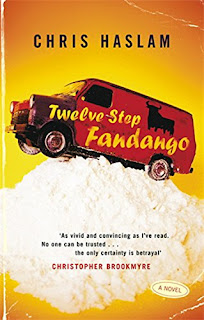Twelve Step Fandango - Chris Haslam
The plot line of Twelve Step Fandango is nothing special and not particularly original, but it moves along purposefully with a reasonable pace for the most part. If the plot is not particularly interesting, at least the characters are - Alberto, the advertising dialogue speaking smuggler and pirate radio presenter, Morales, a poetry quoting Guardia Civil (yeah, as if!) - but they are treated abysmally by the author who bumps them off callously and rapidly over the course of the story. Martin himself is a creep and a coward - an unusual lead character to be undertaking an escapade like this - there is nothing heroic about him nor anything noble about his quest. If the plot is reminiscent of Tarantino’s script for True Romance, Martin is not Christian Slater and Luisa is not Patricia Arquette - she is mean, selfish, vicious, bitter and demanding. Tarantino isn’t the best reference however, the novel doesn’t have the bite or the snappiness of the director’s dialogue - Martin is much more real-world, not particularly charming, nor particularly witty, but prone to the occasional poetic musing. I particularly liked the imagery of the Fandango dancer, the guitarrista and the references to the shadowy El Duende. They offer the novel a slightly darker tone than you are expecting up to that point, even if they don’t have any obvious relevance to the story. Another nice little poetic touch comes when Martin is being called by the river, an outward expression of Martin’s cowardly nature, inviting him to give up and end it all.
Unfortunately this darker tone and Martin’s utterly unlikable persona threaten to overwhelm the book. The body count unnecessarily mounts as the French gangsters take inexplicable risks and become extremely trigger-happy. Martin also becomes eminently detestable. If not directly responsible for the deaths of nearly every single person he knows, he has at least brought death to their doorstep and bears not the slightest pang of remorse for their suffering. The story nearly lost me entirely when Martin decides to have a breather in a church and bizarrely and pointlessly confesses everything to a priest without the slightest remorse and no interest in moral guidance. For a complete and utter coward though, he still manages to hold on doggedly to his goal and prize, gladly selling-out everyone and anything and risking certain death to retain possession of his cocaine. A true portrait of an addict, I’m sure, but not a very pleasant one to carry a novel.
In complete opposition to the character built-up this far and despite everything he has gone through, in the end Martin just gives up. The appearance at the end of a couple of Northern Irish Loyalist drug smugglers neatly bring the book to a rapid, but rather unsatisfying conclusion. In the end, everyone loses and Martin accepts this in the same spirit as he has accepted the deaths of everyone else - with fatalistic indifference and a bitter aftertaste. I think that would also pretty much sum up my own feelings after reading this book.




Comments
Post a Comment